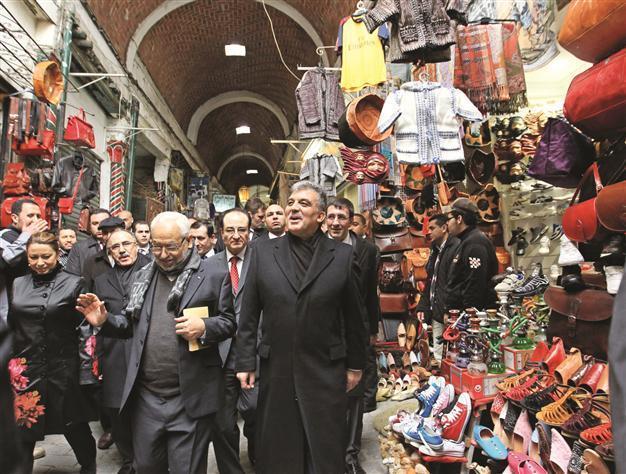Gül: Religious-based politics harm faith
ISTANBUL - Daily News with wires

Turkish President Abdullah Gül (R) tours a souk in Tunis with senior Tunisian politician and Ennahda leader Rached Ghannouchi during his recent visit to Tunisia. AA photo
Turkish President Abdullah Gül has warned Muslim countries against seeking religious-based politics, saying parties that promise such rule would ultimately harm the faith.If a political party that comes out in the name of Islam fails, it will defame and humiliate the religion itself, Gül told a Tunisian television channel. “If one comes forward, saying one is ‘religious’ and then fails, what will be harmed? Thus, one has more responsibility [to be wise]. Furthermore, policy should not be conducted based on religion,” he said. “If religion directly becomes a tool for politics, that would hurt religion a lot,” he said.
“Because of this, Turkey does not have religious parties,” Anatolia news agency quoted him as saying. Still, Gül said the rise of Islamist parties reflected “the flow of the people to their own channel.”
The statements echo previous comments from Prime Minister Recep Tayyip Erdoğan, who advised Egyptians last September to not fear secularism. “I suggest that Egypt should have a secular constitution, because secularity is not an enemy of religion,” Erdoğan said in Cairo. “Do not fear secularity. I hope the new regime in Egypt will be a secular one.”
Gül also advised Muslim countries to adopt democracy, accountability and transparency, saying democracy and Islam did not contradict each other.
Radar comments
“Being transparent and accountable, are these against Islam? Equality as citizens, not allowing corruption, fighting against injustice and oppression, are these against Islam? All of these are the values of Muslims,” Gül said. The president described freedom of belief as a condition of democracy. Gül also commented on the NATO missile radar system based in the eastern province of Malatya. When reminded of allegations from Israeli analysts that the system aimed to protect Israel, he said: “This is definitely not the case. Israel is not a NATO member, thus it cannot benefit from NATO capabilities, especially when Turkey is [involved]. Every move within NATO comes via unanimity. These accusations are black propaganda from the Israelis.”
The Turkish president also said the radar system was not directed against Iran. “We are a country that helped stop communism in the region, and this radar system is a precaution against missiles, as part of NATO defenses. Thus, it is not of an offensive quality. It is not against countries, it is against missiles.” Gül also pointed to the European Union as an example to the region, voicing hope that “regional brotherhoods” would be further strengthened.
















